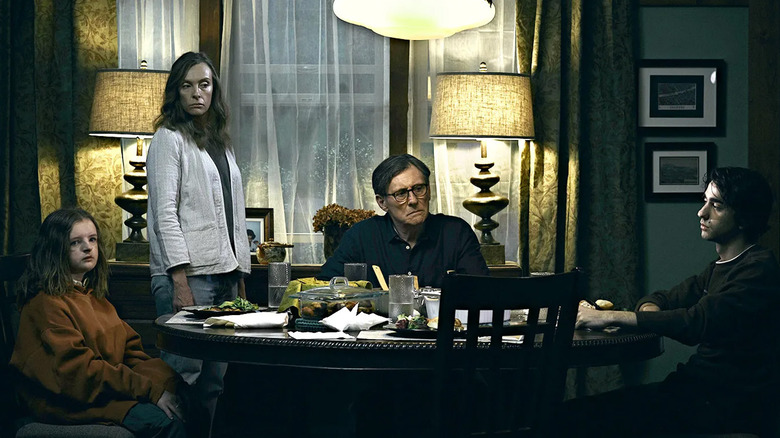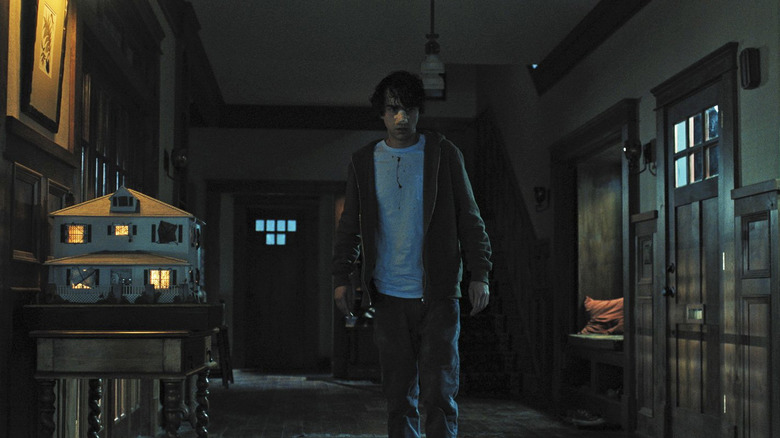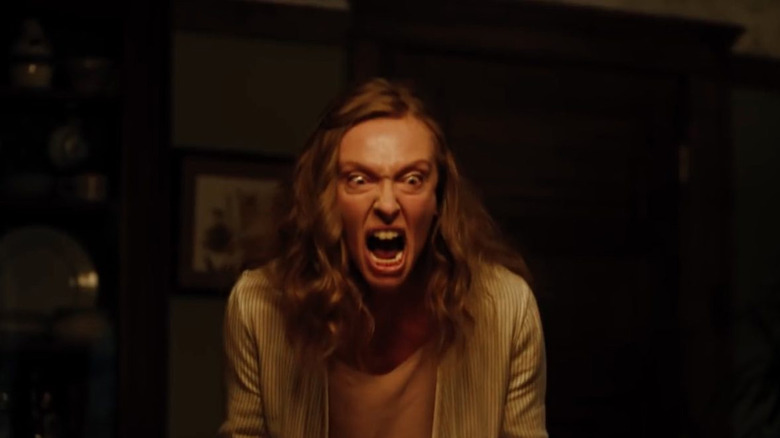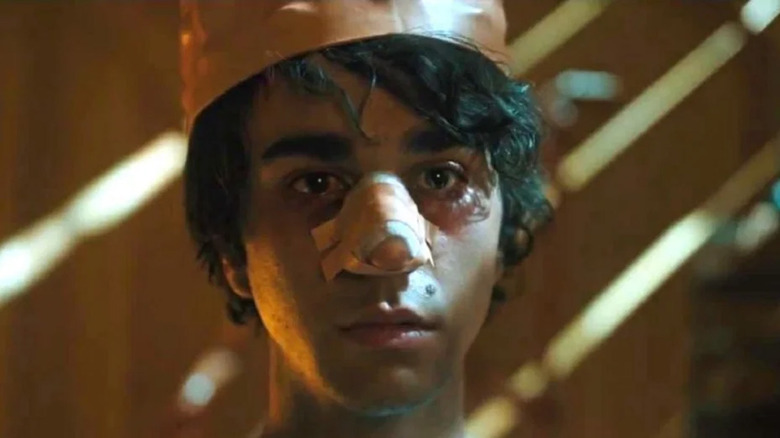The Reason Ari Aster Didn't Pitch Hereditary As A Horror Movie
It's undeniable — "Hereditary" is one of the most unsettling films of the last decade. A highly strung family melodrama that hides elements of the supernatural, "Hereditary" goes to great lengths when keeping its hideous secrets just out of sight. And that's only the beginning.
"Hereditary" tells the story of the Graham family, whose matriarch, Ellen Taper Leigh (Kathleen Chalfant), has passed away. Immediately beginning with Ellen's funeral, the entire film takes an off-kilter turn as the family begins to unravel. An unresolved tension runs deep through the Graham family. Young Charlie (Milly Shapiro) was her grandmother's favorite and is now clearly struggling after her grandma's death. Ellen's daughter, Annie (Toni Collette), paints a picture of a distant mother, a fractured family, and a missing brother who died by suicide due to their mother's eerie influence.
And then there's poor Peter (Alex Wolff). He starts off as an average teenager trying to find his place in the world. But with the weight of his sister's death on his conscience and a mother whose unsettling outbursts dominate the household, Peter becomes more and more unhinged.
Of course, the events of the film are all tied together by a mysterious cult that has had a guiding hand in the family's misfortunes, and it turns out that grandma has been prepping the family for the coming of a demonic entity. Using her grandson's body as a vessel for the demon Paimon, it's an otherworldly twist that puts the film firmly in the realms of horror.
But writer and director Ari Aster didn't pitch it that way. "The film is a horror film, it's unabashedly one, but as I was pitching it, I was describing it as a family tragedy that curdles into a nightmare," he told NPR.
The slow, creeping tension that strangles its main characters is as gripping as it is horrific, and it's not long before that nightmare takes hold. Here's how "Hereditary" creates horror out of the mundane.
Try again. Release yourself.
Throughout "Hereditary," an undeniable tension simmers. Its presence even in the most mundane scenes is a sign of things to come. But while it's a clear signpost for a horrific ending, it also tells the story of a fractured family that's wearing itself down.
Annie isolates herself from the rest of the family, an artist working long hours. Peter is a typical teenager, lashing out as teenagers do, smoking weed and chasing girls, much to his mother's disdain. The family itself is burdened by a long history of secrets — grim family stories they just don't talk about, hushed away as neatly as the family crockery. Tragedy runs deep in the Graham household that's never spoken about. But it's more than that.
Beneath the tragedies lies a darkness that's not explained until the film's final act. It's hinted at throughout, but the family is left to grapple with half-told stories that never quite add up. It all goes back to Ellen, the deceased matriarch. There's a weirdness there, in her relationship with Annie, and her overly close bond to granddaughter Charlie. But while the history of weird events goes back to Annie's brother's suicide, a new family tragedy is about to unbottle it all. You know what I'm talking about — that moment.
"It's designed to be a left turn that changes the course of the rest of the movie," Aster told NPR. "But I guess it's really also designed to operate more like a chute that opens up under the audience and kind of drops them into hell."
The horrific decapitation of Charlie is the catalyst for the Graham family's descent into hell, too. Family tensions begin to boil over, and the melodrama they now can't escape from underlines the supernatural horrors that lurk beneath the surface. But it's more than that.
Grandma Ellen had previously summoned the demon Paimon, capturing him in Charlie's body. With the child now killed, Paimon has been released, and is free to take over his new host, Peter. It's here that things really take a turn.
Is there something on your mind?
"Hereditary" stands out from other similar supernatural horrors because of its familiarity. It's a story about an everyday family struggling with everyday woes. That is, until you realize a demon-worshipping cult has been manipulating them all along. But take away the supernatural elements and you're left with a grim look at a family bound by catastrophe. Ari Aster told NPR:
"I wanted the film to function first as a vivid family drama before I even bothered attending to the horror elements. This family is ultimately eating itself out of grief, and I wanted to make a film that took suffering seriously."
More than taking it seriously, "Hereditary" underpins its supernatural horror with a family tragedy that could easily have been the sole focus of the film. The unsettling circumstances surrounding the Grahams only serve to heighten the tension. And that's when things get really creepy.
One of the more unsettling aspects of the film, Annie's art takes the form of lifelike dioramas of her own experiences. But reality and art begin to collide when the camera frames characters in the film as though they're figures in one of her pieces. "It just struck me as a solid metaphor for the family's situation, which is that they're ultimately people without any agency," continued Aster. "They are like dolls in a dollhouse, being manipulated by these outside forces."
And as the family falls apart, the outside forces grow even stronger.
You are Paimon, one of the eight kings of hell
Ultimately, "Hereditary" shows that the Grahams are as much responsible for their own downfall as the cult that has been watching over them — even if the explosive ending might lead you to think otherwise.
After going through hell and back, Peter is revealed to be the focus of the entire story. The death of his sister, his mother's unraveling, and everything that follows serve to wear him down emotionally. Only at his lowest point can he become susceptible, and he's used as a vessel for the demon Paimon. That's right, his grandmother manipulated their entire lives for this purpose.
You can see evidence of this throughout — the hints of occult goings-on, glimpses of Paimon's seal. It's all in the service of summoning one of the eight kings of hell. But it's the family melodrama that makes it all possible, binding the two different stories inextricably.
"I always knew I was making a film that was potentially very alienating," continued Aster to NPR. "It is a film whose primary aim is to upset the audience on a deep level." And upset it does. The family turmoils are deep, and the innocent suffer.
"I never wanted to be your mother," confesses Annie late in the film. She tried to have a miscarriage when carrying her son, Peter, and confesses as much in a startling dream she has. Clearly, this family has been doomed for a long time.
The family drama may seem mundane on the surface, but it's rooted in evil. And that's how "Hereditary" binds the two aspects of itself in perfect, devilish harmony.



